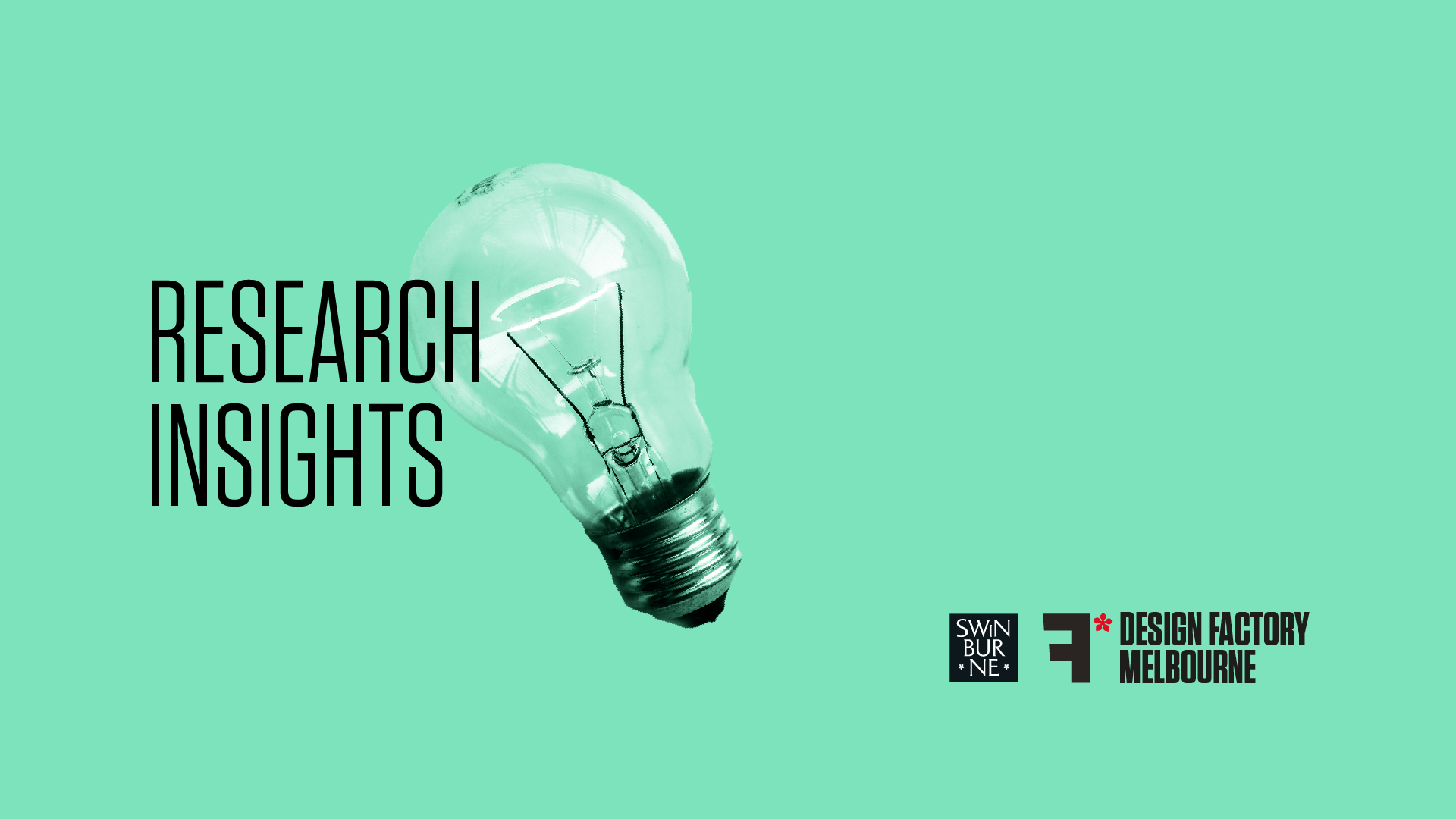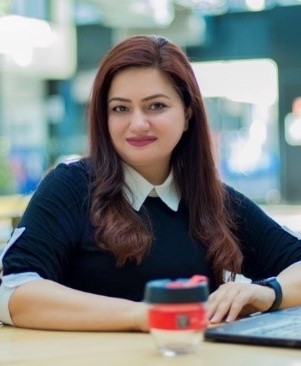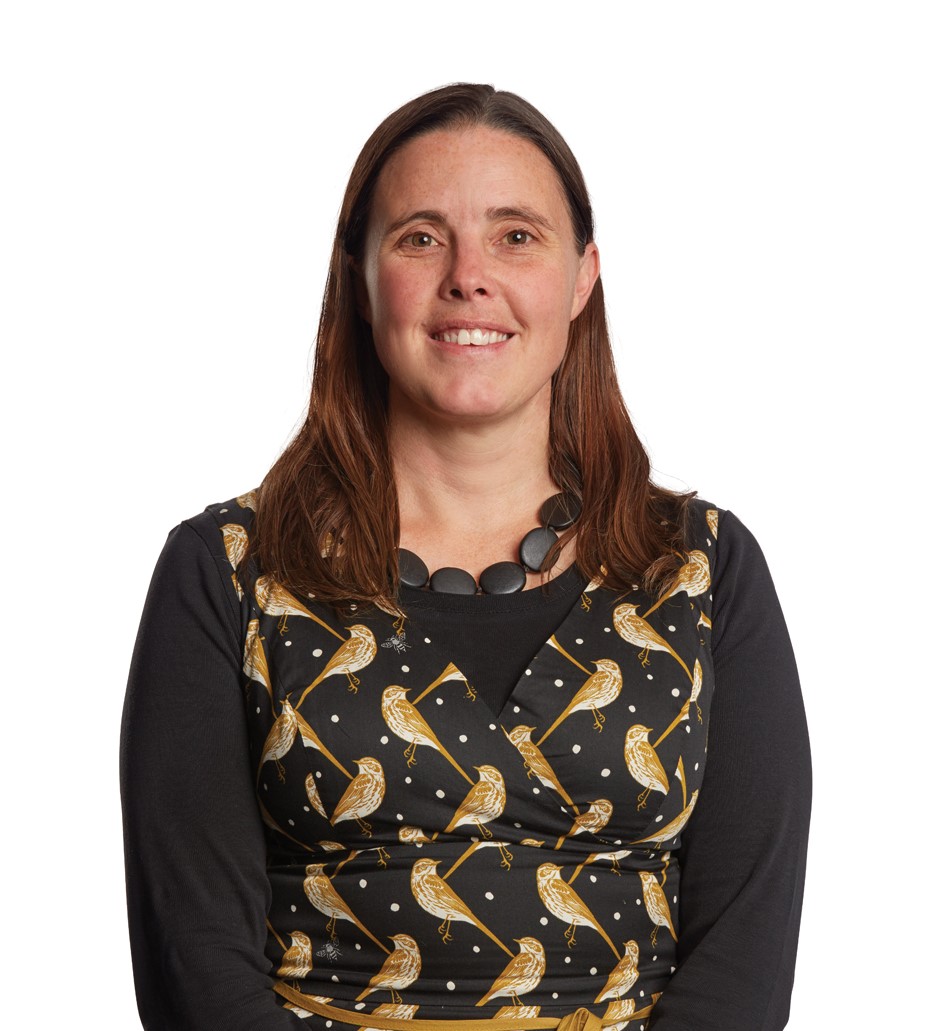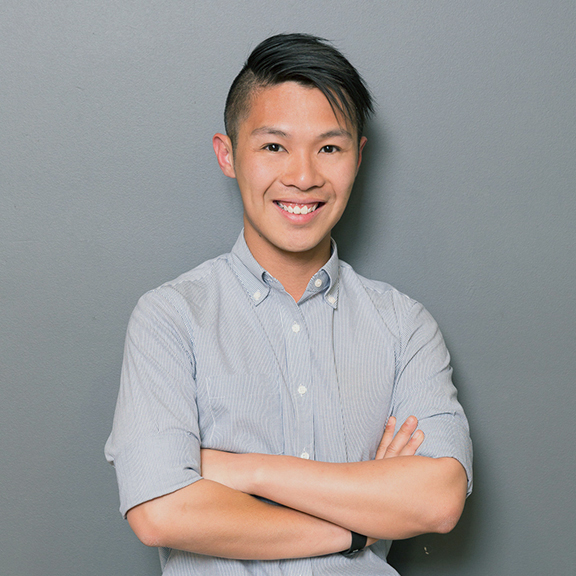
Your next lightbulb moment is around the corner!
Research Insights is a presentation series hosted by Design Factory Melbourne (DFM) aimed at fostering interaction and collaboration between academics, students, and industry. Presentations are informal and collegial – join us at the Firestation to hear what others are working on, or share something of your own!
Research presented will include works in progress, through to more developed and established content.
The event is held on the dates below from 5:00pm – 6:00pm (doors open 4:45pm) in the Firestation at 66-68 William Street (enter via McLeod Ln), Hawthorn.
“Innovation is not linear. It is fuzzy, particularly at the beginning. On the journey, diversity is key, it improves the quality of results.”
Dr. Markus Nordberg, CERN & IdeaSquare at CERN
Past Speakers

Thursday 3rd October 5:00pm – 6:00pm | Muneera Bano
Diversity and Inclusion in the Futuristic world of A.I.
We live in a world marked by racial, gender and economic based hierarchies. The lack of diversity and inclusion in giant tech companies is going to make it harder for underrepresented groups to break through these classifications in future. The advent of AI promises to overcome human limitations of speed, processing and thought, opening up a whole new range of possibilities for how we live and work. However, AI is also a product of colonial mentality and it is also exacerbating human biases, discriminations and hate-speech.
So what can be done? When a technology is going to shape the future of the society, it is time to look at the design of AI from a diverse and inclusive vintage point by not just diverse groups of software engineers (gender, race, identities) but also representative people from cross disciplinary backgrounds of Ethics, Philosophy, Political Science, Psychology and Literature.
About Muneera
Dr Muneera Bano is a lecturer of software engineering at the Swinburne University of Technology. Muneera graduated from the University of Technology Sydney in 2015 with a PhD in Software Engineering, where she also worked as a Post-doctoral researcher under the ARC Discovery project and was a ‘Learning and Teaching Adjunct’.
During her research career, Muneera has received numerous prestigious accolades as recognition for her work, including being named as a finalist for Google Australia’s Anita Borg Award for Women in Computer Science, Asia-Pacific 2015, Schlumberger’s Faculty For The Future (FFTF) Award for Women in STEM (2014 and 2015) and was given the ‘distinguished research paper award’ at International Requirements Engineering Conference held on August 2018. She has been selected as one of the 60 ‘Superstars of STEM’ for 2019-2020 by Science Technology Australia. Superstars of STEM program aims to smash society’s gender assumptions about scientists and increase the public visibility of women in STEM. Most recently she has been announced as the overall winner of the inaugural 40-under-40 Most Influential Asian-Australian award for 2019.

Thursday 12th September 5:00pm – 6:00pm | Kay Cook
Building an evidence base to challenge government data, processes and policies
Government agencies such as Centrelink increasingly hold welfare recipients responsible for managing their eligibility and payment conditions. However, system complexity and insensitivity can result in Robotdebts, and ParentsNext and Job Network ‘breaches’ that exacerbate the poverty experienced by single parent households. In this presentation, Professor Kay Cook will examine how separated mothers are asked to assemble and provide data to government agencies and the opportunities that these processes provide for procedural justice. Drawing on examples from child support and welfare contexts, Kay will illustrate how bureaucratic data gaps and omissions reinforce the social hierarchies that exist following parental separation. Through these systems, single mothers are often financially and socially disadvantaged, while welfare administrators and ex-partners accrue savings and discretionary benefits as a result. She will conclude by setting out a research program that seeks to intervene in these data systems at individual, institutional and political levels.
About Kay
Kay Cook is an Associate Professor and Australian Research Council Future Fellow in the Department of Social Sciences at Swinburne University of Technology. Her Future Fellowship examines the personal, practical and institutional barriers to child support faced by women in Australia, the UK and USA. This project will build on her gender critique of child support policymaking, data practices and implementation in order to strike a more equitable balance between women’s responsibility for managing child support payments and the social, administrative and political context in which this responsibility exists.

Thursday 1st August 5:00pm – 6:00pm | Sean Sands
Redefining health and wellness for competitive advantage
The health and wellness industry is set for disruption, including human-robot service interactions, the cannabis med-tech industry, and the use of well-being as a competitive advantage in retail strategy. In this seminar, Associate Professor Sean Sands will present a series of trends and innovative research drawing on current research projects and latest inspiration from SXSW 2019, highlighting upcoming market disruptions and cutting edge industry trends which provide a wealth of inspiration for innovative research directions.
About Sean
Sean is the Associate Professor of Marketing at Swinburne Business School. He is also the Director of the Customer Experience & Insight (CXI) Research Group, a commercially-oriented group that works with organisations to generate foresight though insight. CXI work with brands to develop optimal customer experiences and inform experience innovation.
Sean has delivered seminars globally on retail innovation, design thinking and customer experience strategies, Sean has assisted brands in mapping customer experiences and develop an understanding of the customer journey, expectations, needs and desires. He frequently presents at industry conferences on the future of retail and consumer behaviour. His research expertise includes strategy, service design, customer experience design, advanced research methods, new product development, pricing research, and market segmentation. He is published in European Journal of Marketing, Journal of Business Research, Journal of Retailing, and Journal of Retailing and Consumer Services, among others. Sean teaches Marketing Strategy and is a visiting Professor at EADA Business School in Barcelona, where he teaches CX Design in the MBA program.

Thursday 11 April 5:00pm – 6:00pm | Sally McArthur
A Tale of Two Projects: Launching the Medical Device Partnering Program in Victoria and Creating 4D Cell Culture Systems, voyages in collaboration.
“It was the best of times, it was the worst of times, it was the age of wisdom, it was the age of foolishness, it was the epoch of belief, it was the epoch of incredulity, it was the season of Light, it was the season of Darkness, it was the spring of hope, it was the winter of despair…” Charles Dickens, A Tale of Two Cities
Bioengineering is an inherently multidisciplinary field, we bring together science and technology knowledge with insights from clinical practice and if we aim to create both useful and usable solutions, we welcome end users, designers and many others into our teams.
This talk will introduce you to two very different projects I am currently leading, one a research-led innovation approach and the other a community building exercise to integrate research and development knowledge to support the development of new medical devices.
4D Cell Culture Systems
There is increasing demand for reproducible and predictable 3D in vitro models that effectively replicate the tissue of interest and will enable the evaluation of biomaterials and smaller implantable devices. These systems need to
- replicate specific physical and biochemical aspects of the biological system.
- be readily manipulated to address specific research questions or target specific biological pathways
- be reproducible, scalable and critically, validated against the gold standards.
This talk will explore the challenges in developing these systems and discuss approaches being made in the 4D Cell Culture team at CSIRO and Swinburne.
Medical Device Partnering Program (MDPP) in Victoria
The MDPP was launch over 10 years ago in South Australia by Prof Karen Reynolds. Victoria is the first state to launch as part of a new national program roll out. So what is the vision for the program in Victoria, how does it fit into our much larger and more diverse community and what opportunities does it create for researchers and entrepreneurs to generate new medical devices and assistive technologies? All this and more will be discussed!

Thursday 21 February 5:00pm – 6:00pm | Linus Tan
Unknown Futures: What design can teach us in navigating uncertainty
It is undeniable that technologies are replacing our workforces. Labour-intensive roles are gradually being replaced by technologies like robotics and machine learning algorithms. Knowledge workers are at risk too. Development in artificial intelligence and computing processing power are endangering roles once thought to be safe from the machines. Without a doubt, the future of work is yet to be set in stone. Perhaps, it will never be.
With such uncertainties ahead of us, how can design make us future-ready? At its simplest level, the design process eliminates problems by developing solutions (design as problem-solving). At a more sophisticated level, the design process creates the opportunities for innovation and change (design as opportunity making). Yet, how do we continue operating at this level? Are we leveraging design enough to carve new opportunities out of uncertainties?
About Linus:
Linus Tan is a PhD candidate at Design Factory Melbourne. His research project seeks to identify how architects build and use their tacit knowledge in their design process and how said knowledge can be used as a strategic resource in their practice. His other research interests include design innovation, strategy formation and digital fabrication.
He graduated with a Master of Architecture degree and has worked on a range of projects, from human-scale pavilions to mixed-used multi-residential buildings. He also has Strategic Management experience from coordinating military organisations and directing a digital fabrication laboratory. He currently runs a foresight and strategy design consultancy and teaches design entrepreneurship.
